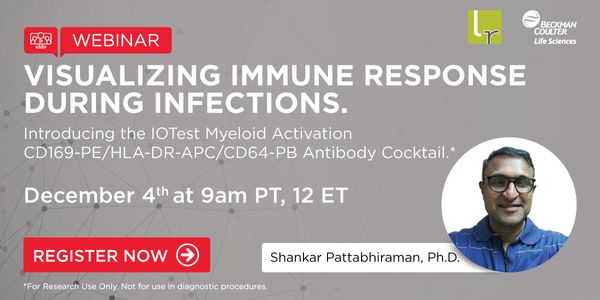Antibody tests are important tools to assess the efficacy of vaccine candidates and to derive suitable vaccination modalities. High specificity and sensitivity are of great importance for th...
DEC 02, 2020 | 9:00 AM
DATE: December 2, 2020 TIME: 9:00am PDT Pluripotent stem cell (PSC) research is a continuously evolving field that beholds great promises for the future. The great application potential of P...
DEC 02, 2020 | 8:00 AM
DATE: December 2nd, 2020 TIME: 08:00am PDT, 11:00pm EDT Bioreactors and shakers are used to cultivate microorganisms, plant, insect, and mammalian cells in different volumes. Upscaling of pr...
DEC 01, 2020 | 1:00 PM
DATE: December 1st, 2020 TIME: 01:00 PM - PDT, 3:00 PM - Bogotá / Ciudad de México, 5:00 PM - Buenos Aires / Sao Paulo La anemia es un trastorno que afecta principalmente c&eac...
NOV 20, 2020 | 12:00 PM
Date: September 30, 2020 Time: 9:00am (PDT), 12:00pm (EDT) Learning Objectives Why is Stewardship important? What are the core elements of stewardship and microbiology's role Importance...
NOV 20, 2020 | 8:00 AM
DATE: November 20, 2020 TIME: 8am PDT, 11am EDT Insulin-like growth factor-1 (IGF-1) measurement by high-resolution accurate mass-mass spectrometry (HRAM) is replacing IGF-1 immunoassays and...
NOV 19, 2020 | 10:00 AM
Date: November 19, 2020 Time: 10:00am (PST), 1:00pm (EST) 98% of in-patients will undergo a diagnostic test during a hospital stay.[1] With the increased focus on the accuracy of diagnostic...
NOV 19, 2020 | 9:00 AM
DATE: November 19, 2020 TIME: 9:00am PT, 12am ET Knowledge of the three-dimensional structure of therapeutically relevant targets has become an essential step in the pipeline of drug discove...
NOV 19, 2020 | 8:00 AM
Date: November 19, 2020 Time: 8:00am PST, 11:00am EST Monoclonal antibody-based drugs have shown great potential as a treatment for several cancers. At Miltenyi Biotec, we offer a complete wo...
NOV 19, 2020 | 7:00 AM
DATE: November 19, 2020 TIME: 7am PST Congenital CMV is the most frequent infectious cause of neonatal malformation in developed nations. Yet, this disease is largely under-recognized by hea...
Two aspects of the Cost of Quality are important in the medical laboratory—the theory behind the quality cost types and the application of those cost types to laboratory activities. Th...
























